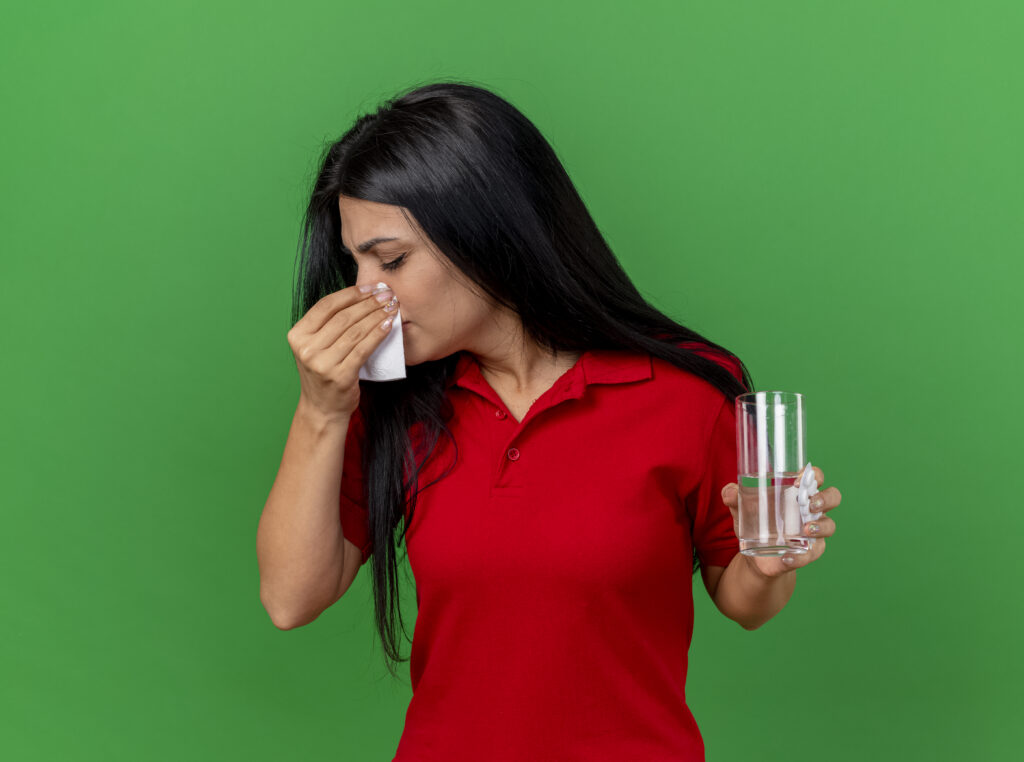
Table of Contents
Introduction
Water Allergy is one of the unique kind of allergy in this world. Envision having a sensitivity to something as fundamental for life as water. It might sound puzzling, yet for certain individuals, this surprising condition is a reality. Aquagenic urticaria, regularly alluded to as a “water sensitivity,” is an uncommon and fascinating ailment that makes people break out in hives when their skin comes into contact with water. While it may not be a genuine sensitivity, it shares a few likenesses in its show. In this blog, we will investigate the captivating universe of aquagenic urticaria, disperse a few normal fantasies, and give experiences into how people impacted by this condition can oversee it successfully.
What is Aquagenic Urticaria?
Aquagenic urticaria is an uncommon problem that makes an individual’s skin respond unfavorably when it experiences water, regardless of its temperature. The expression “urticaria” is frequently used to depict hives, which are red, bothersome welts that show up on the skin. These hives can go from little, irritated knocks to bigger, more articulated rashes.
In spite of its deceptive moniker, aquagenic urticaria is certainly not a genuine sensitivity to water. Sensitivities are insusceptible framework reactions to proteins or substances that the body distinguishes as unfamiliar. On account of aquagenic urticaria, the specific instrument isn’t completely perceived, however including the connection among water and a part of the skin, prompting the arrival of histamines is accepted.
Causes Behind Water Allergy
The exact causes of water allergy remain a subject of ongoing research. Some theories suggest that it might be related to a hypersensitivity to certain ions or temperature changes in the water. Understanding these triggers is crucial for effective management.
Symptoms of Water Allergy
The symptoms of aquagenic urticaria can vary in severity. After coming into contact with water, individuals with this condition may experience:
- Red, itchy hives or welts
- Burning or stinging sensations on the skin
- Swelling in the affected areas
- The development of blisters in severe cases
The onset of symptoms is often rapid, typically occurring within minutes of water contact. The affected areas are usually limited to the skin that was exposed to water, making it different from typical allergies that can involve systemic reactions.

Myths about Aquagenic Urticaria
Misconceptions about aquagenic urticaria abound, mostly due to the condition’s misleading name and rarity. Let’s debunk some of these myths to gain a clearer understanding of this unique condition.
Myth #1: Aquagenic urticaria is a true allergy to water. Fact: Aquagenic urticaria is not an allergy in the traditional sense. It is a condition that involves a complex interaction between water and the skin, leading to the release of histamines. True allergies involve the immune system’s response to foreign proteins or substances.
Myth #2: People with aquagenic urticaria cannot bathe or shower. Fact: While it may sound counterintuitive, individuals with aquagenic urticaria can still maintain personal hygiene. They often have specific routines and treatments in place to manage their condition, allowing them to continue bathing and showering.
Myth #3: Aquagenic urticaria is a life-threatening condition. Fact: Aquagenic urticaria is generally not life-threatening, but it can be uncomfortable and distressing for those who experience it. Managing the condition through lifestyle adjustments and medications is often effective in controlling symptoms.
Diagnosis and Treatment of Water Allergy
Diagnosing water allergy isn’t as straightforward as other allergies. Medical professionals often use controlled exposure tests and consider the patient’s medical history. As for treatment, antihistamines are commonly prescribed to alleviate symptoms, but there’s no definitive cure.
Living with Water Allergy
The day-to-day life of someone with a water allergy involves careful planning and adjustments. From choosing the right hygiene products to the timing of activities involving water, every decision revolves around avoiding triggers.
Prevention Strategies
While complete prevention may not be possible, individuals with water allergy can take certain precautions. This includes using lukewarm water instead of hot water and opting for hypoallergenic skincare products.

Misconceptions about Water Allergy
There are several misconceptions surrounding water allergy. Some may think it’s a psychological condition or a mere exaggeration. It’s essential to dispel these myths and foster understanding and empathy.
Case Studies: Real Stories
Let’s hear the stories of real people living with water allergy. Understanding their experiences sheds light on the challenges they face and the resilience they demonstrate in adapting to this unique condition.
Impact on Daily Life of Water Allergy
Beyond the physical discomfort, water allergy can have a significant impact on one’s mental and emotional well-being. We’ll explore the broader implications of this condition on daily life.
Managing Aquagenic Urticaria
Living with aquagenic urticaria can be challenging, but with the right strategies, individuals can effectively manage their condition. Here are some practical tips to help those with aquagenic urticaria lead a more comfortable life:
Avoid hot water: Heat can exacerbate symptoms, so using lukewarm or cool water when necessary can help reduce the intensity of the reaction.
Use non-soap cleansers: Non-soap cleansers and hypoallergenic soaps are gentler on the skin and less likely to trigger a reaction.
Pat dry gently: After coming into contact with water, gently pat your skin dry with a soft, clean towel rather than rubbing vigorously.
Apply barrier creams: Some individuals find relief by applying barrier creams or ointments to their skin before water exposure, which may help reduce the severity of the reaction.
Take antihistamines: Over-the-counter antihistamines can provide relief from itching and reduce the severity of hives for some people. Consult with a healthcare professional before starting any medication.
Stay hydrated: Drinking plenty of water can help maintain overall skin health and may reduce the intensity of the reaction for some individuals.
Identify trigger factors: Pay attention to factors that may worsen your condition, such as stress or specific foods, and take steps to manage or avoid them.
Seek medical advice: If you suspect you have aquagenic urticaria or are struggling to manage your symptoms, it is essential to consult a healthcare professional. They can provide a proper diagnosis and recommend suitable treatments.
The Role of Medical Professionals
Medical professionals play a crucial role in supporting individuals with water allergy. From diagnosis to ongoing management, their expertise is vital in enhancing the quality of life for those affected.
Coping Mechanisms
Coping with a condition like water allergy requires resilience and creativity. We’ll explore some coping mechanisms that individuals have adopted to navigate daily life with this unique challenge.
Future Research and Developments
As science continues to advance, researchers are exploring new avenues for understanding and treating water allergy. We’ll discuss some promising developments on the horizon.
Basic reassurance and Adapting
Living with an uncommon condition like aquagenic urticaria can sincerely challenge. People might encounter sensations of dissatisfaction, confinement, or humiliation. Looking for daily encouragement from companions, family, or care groups can have a massive effect. Interfacing with other people who have comparable encounters can assist people with acknowledging they are in good company and give a stage to sharing survival methods.
Conclusion
Aquagenic urticaria, frequently alluded to as a “water sensitivity,” is an uncommon and intriguing condition that, while not a genuine sensitivity, shares a few qualities with sensitivities. It very well may be troubling for the people who experience it, yet with the right methodologies and backing, people with aquagenic urticaria can lead satisfying lives.
Figuring out the idea of this condition, scattering normal legends, and sharing down to earth ways to oversee side effects is fundamental for bringing issues to light and offering help to those impacted by aquagenic urticaria. With the right information and assets, people with this condition can have blissful, solid existences and explore the difficulties that accompany their novel finding.
Frequently Asked Questions (FAQs) related to Water Allergy
Is water allergy common?
- No, water allergy is extremely rare, affecting only a small percentage of the population.
Can water allergy be cured?
- Currently, there is no cure for water allergy, but symptoms can be managed with medical intervention.
How is water allergy diagnosed?
- Diagnosis involves controlled exposure tests and consideration of the patient’s medical history.
Do all types of water trigger the allergy?
- The triggers can vary, but it’s often related to temperature and certain ions in the water.
What can friends and family do to support someone with water allergy?
- Understanding and empathy go a long way. Simple adjustments, like using hypoallergenic products, can make a significant difference.

Pingback: Gentle Ways - How to Open a Blocked Ear at Home : No. 1 Simple and Effective Solutions - CREATIVE WEB-MANIA
Pingback: How to Make Your Own Perfume at Home : Unlock Your No. 1 Signature Scent - CREATIVE WEB-MANIA
You’re so awesome! I don’t believe I have read a single thing like that before. So great to find someone with some original thoughts on this topic. Really.. thank you for starting this up. This website is something that is needed on the internet, someone with a little originality!
Hello! I just wanted to say how much I appreciated this blog post. Your writing is always so engaging and informative. It’s clear that you have a deep understanding of the subject matter. Thank you for sharing your expertise with us. Looking forward to your next post!
Thank you for this fantastic post! The information you provided is very useful and well-explained. I especially liked how you broke down complex concepts into easily understandable parts. Your writing is clear and concise, making it a pleasure to read. Looking forward to more of your posts.
Hello! I wanted to drop by and say that I really enjoyed this blog post. Your writing is always so clear and concise, and you have a talent for making complex topics easy to understand. Thank you for sharing your insights with us. I’m looking forward to your next post!